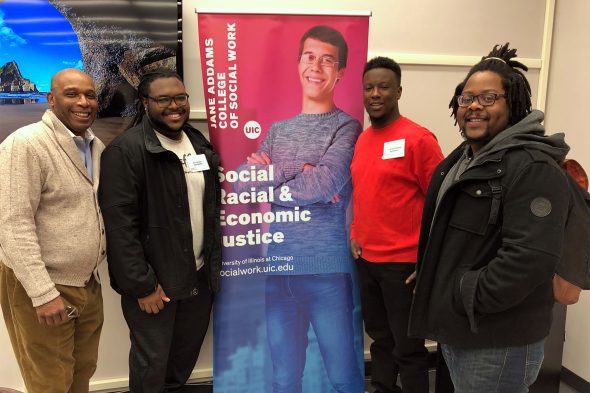UIC students breaking down stereotypes about young Black men

A group at the University of Illinois Chicago is on a mission to break down stereotypes of who young Black men are and what they’re capable of.
We Are Men (WAM) is a program at UIC’s Jane Addams College of Social Work.
Echoing the 1968 rallying cry of African American sanitation workers in Memphis, the WAM program recruits African American males with demonstrated concerns about social and racial justice and the needs of impoverished communities and prepares them for leadership positions in health and human services agencies and organizations. The program provides financial assistance, academic counseling and social support networks to enhance retention, graduation and successful social work careers.
“Providing Black males an opportunity to obtain an MSW with different levels of support through the WAM initiative is vital to the communities that they will serve as leaders, advocates, administrators, and policymakers and changers. The WAM initiative demonstrates JACSW’s commitment to educate social workers and provide service to at-risk urban communities,” said Marybel Flores, visiting assistant dean for admissions and financial aid and visiting clinical assistant professor at the Jane Addams College of Social Work.
Marvin Lindsey, who facilitates the program, said it encourages Black men to earn a master’s degree in social work (MSW). He hopes to recruit young Black men to go on to assume leadership positions in communities and organizations that serve the many Black men who are suffering from trauma.
“Black men in urban settings disproportionately experience violence, challenges in health, education and housing, and justice system involvement, all of which are detrimental to health and well-being,” said Lindsey, a Jane Addams College of Social Work alumnus. “There is a real lack of Black male leaders in social service organizations, where they could bring their perspectives and experiences to better serve their communities, especially other Black men.”
David Banks is part of WAM. He was always looking for ways to improve the Cleveland community where he grew up.
“I saw so much dysfunction in my environment growing up, of people stuck in a loophole, feeling hopeless and not knowing how to better themselves,” said Banks, an MSW student. “I wanted to break the cycle, make a difference, accept responsibility and be a resource. On college tours in ninth grade I saw examples of what other Black leaders have done and it gave me a sense of what I could do.”
Reflecting on his own childhood, Lindsey said he didn’t see examples of Black men in many leadership positions. It was his response that put WAM front and center in his career development.
“I didn’t even see Black quarterbacks in football,” he said. “But when I went to the Henry Horner Boys Club on the West Side of Chicago, I saw Black men in leadership and that was what I looked to. So, We Are Men is really important to me, and I want to devote the rest of my professional career to this effort of helping young Black men on a path to success and leadership.”
Banks and Lindsey began working closely together on We Are Men when Banks began pursuing his master’s degree at UIC. It wasn’t long before Banks assumed a leadership role in the program and began connecting with and bringing together men already in the field to gather knowledge about how to empower Black men to lead in the field.
Creasie Finney Hairston, dean of the Jane Addams College of Social Work, sees the positive impact of WAM as beginning in the classroom but extending far beyond.
“The absence of African American males in our classes was concerning, and not only from a perspective of representation. The silence of their voices in discussions about social conditions and programs was noticeable to both instructors and students,” she said. “Additionally, many agency leaders have expressed a desire to have more Black men in positions of leadership, which can bring many benefits to both agencies and the communities they serve. The WAM program responds to all of these concerns.”
While the program is relatively new, it is already showing success. It had four participants enrolled in the MSW program last academic year and in 2020-21 enrolled 10 participants. Five WAM participants will graduate with their MSW degrees in May 2021.
“Success is seeing these students graduating, advancing their careers in organizations, or maybe launching their own organization,” Lindsey said. “They might even run for office, run a political campaign. That’s a very strong possibility. And it has great impact for the community — for young guys in grammar school now, seeing Black men leading gives them a lot of hope for their own futures.”
After he graduates, Banks hopes to start his own resource center in an urban community to offer therapies, tutoring, job training and other services to empower the community. He wants to offer all the resources that weren’t available to him growing up.
“There’s no telling where I’d be without We Are Men,” said Banks. “It’s prepared me to do the work needed to ensure vulnerable populations, especially Black men, have the resources needed to grow and create change. It is fighting for social justice in making sure there is opportunity for everyone to have an equal chance and be treated fairly.”
